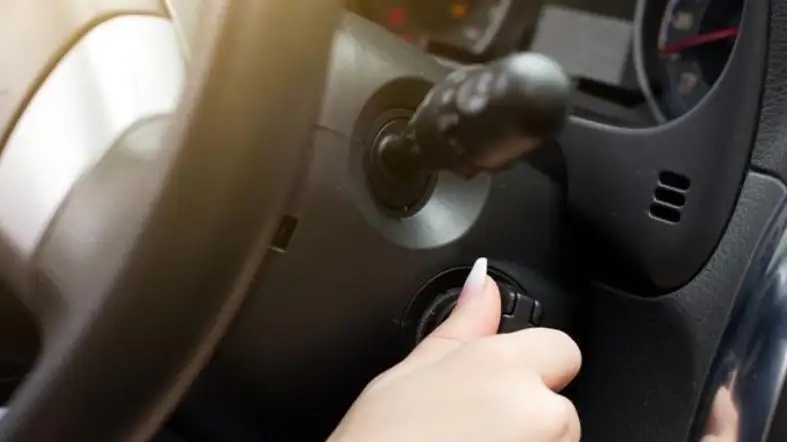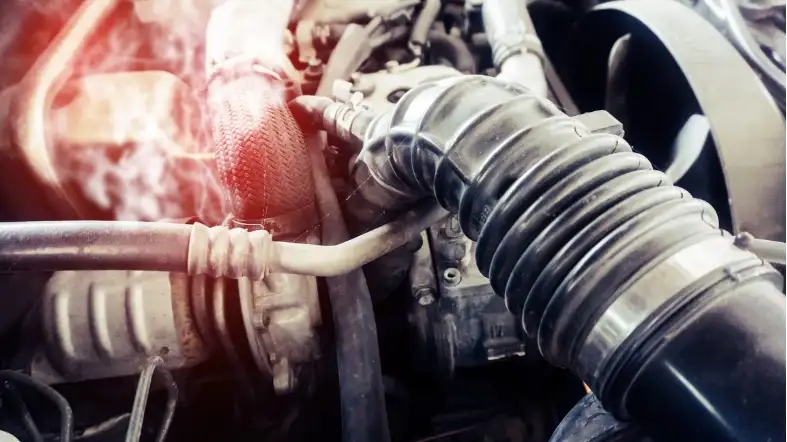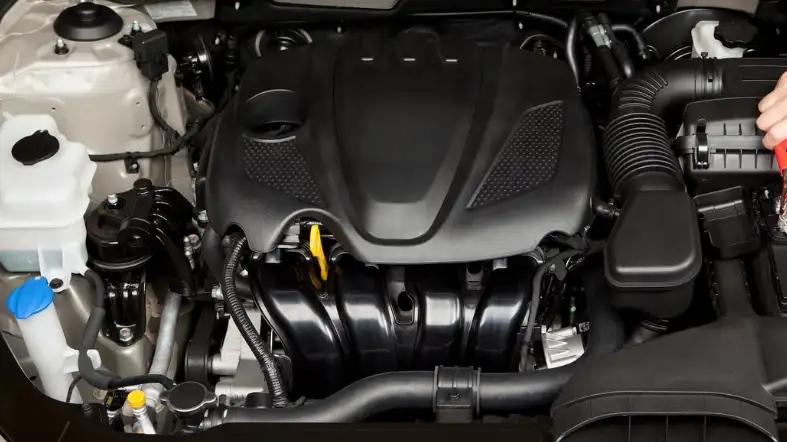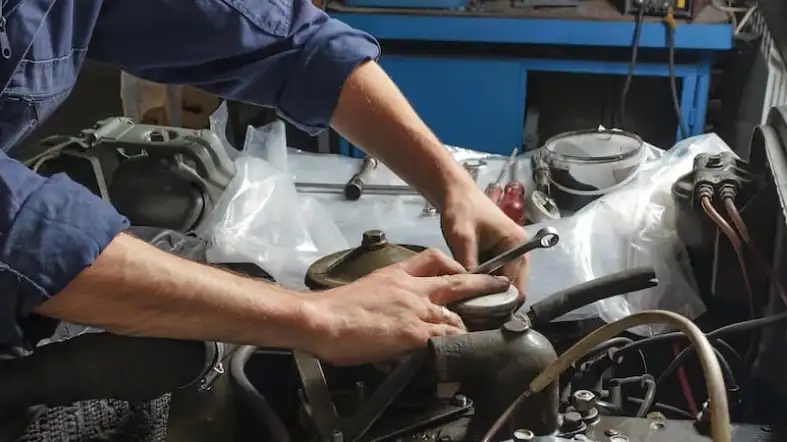When your car’s starter goes out, it can leave you stranded, confused, and scratching your head wondering what happened.
But don’t worry, in this blog, we’re going to explore everything you need to know about what happens when the starter goes out.
From the signs and symptoms of a failing starter to the steps you can take to diagnose and fix the problem, we’ve got you covered.
What happens when the starter goes out?
When a starter goes out, it can cause some serious problems for your vehicle.

The starter is an essential component of the car’s ignition system, responsible for cranking the engine to start it up.
Here are some of the things that can happen when the starter goes out:
1. Engine Won’t Start:
The most obvious sign that your starter has gone out is when you turn the key, and you either hear a clicking sound or nothing at all, and the engine won’t turn over.
This happens because the starter is no longer able to provide the necessary power to initiate the engine’s combustion process.
2. Dimming Headlights:
If you notice that your headlights are dimming when you turn the key, it could be a sign that your starter is failing.
The starter requires a significant amount of power to crank the engine, and if it’s not working properly, it can cause a drain on the battery and electrical system.
As a result, the headlights may appear dimmer than usual when you try to start the car.
3. Grinding Noise:
Another sign that your starter is going out is a grinding noise when you turn the key. This unpleasant noise is often caused by worn gears inside the starter motor.
When the gears become worn or misaligned, they are unable to engage properly, resulting in the grinding sound.
Ignoring this issue can lead to further damage to the starter and other engine components.
4. Frequent Jump Starts:
If you find yourself needing to jump-start your car frequently, it could be a sign that your starter is failing.
Jump-starting can temporarily boost the battery’s power, but it won’t fix a faulty starter.
If your car consistently requires a jump start, it’s essential to have the starter inspected and repaired or replaced as soon as possible to avoid getting stranded unexpectedly.
5. Smoke or Burning Smell:
If your starter is struggling to crank the engine, it can cause the motor to overheat and produce smoke or a burning smell.
This occurs when the starter is drawing excessive current from the battery and electrical system, resulting in heat buildup.
It’s crucial to address this issue immediately, as it can lead to further damage to the starter, battery, and other engine components.
6. Stalling:
A failing starter can cause your car to stall while you’re driving, which is obviously very dangerous.
The starter’s malfunction can disrupt the engine’s normal operation and result in unexpected stalls.
If you notice that your car is stalling frequently or experiencing intermittent loss of power, it’s important to have the starter inspected and repaired to ensure your safety on the road.
What causes the starter problem?

A starter problem can occur for a variety of reasons, and it’s important to diagnose the cause to fix the issue. Here are some common causes of starter problems:
1. Dead Battery:
A dead or weak battery is a frequent culprit behind starter problems.
When the battery lacks sufficient power, it cannot adequately turn the starter motor, resulting in the engine’s failure to start.
It’s essential to ensure that your vehicle’s battery is charged and in good condition.
2. Faulty Starter Motor:
The starter motor plays a vital role in initiating the engine’s operation.
If the starter motor becomes faulty or worn out over time, it won’t be able to perform its intended function properly.
This malfunction can prevent the engine from starting and may require a replacement or repair of the starter motor.
3. Faulty Starter Solenoid:
The starter solenoid is an electrical component responsible for engaging the starter motor when you turn the ignition key.
If the solenoid becomes faulty, it fails to engage the starter motor, leading to a non-starting engine.
In such cases, replacing the faulty starter solenoid is necessary.
4. Ignition Switch Failure:
The ignition switch is responsible for transmitting power from the vehicle’s battery to the starter motor.
When the ignition switch malfunctions or fails, it interrupts the power flow to the starter motor, resulting in an engine that won’t start.
Replacing the faulty ignition switch is essential to restore the functionality of the starter system.
5. Wiring Issues:
Problems in the wiring system can also cause starter problems.
Loose or corroded connections within the starter circuit can disrupt the flow of power to the starter motor, preventing the engine from starting.
It’s crucial to inspect the wiring connections and address any issues promptly, such as tightening loose connections or cleaning corroded terminals.
6. Bad Starter Relay:
The starter relay acts as a switch, transmitting electrical power from the battery to the starter motor.
When the starter relay becomes defective, it fails to send power to the starter motor, resulting in an engine that won’t start.
Replacing the faulty starter relay can resolve this issue and restore proper functioning.
7. Engine Seizure:
In rare cases, the engine itself can be the cause of starter problems.
When the engine seizes or becomes locked up, the starter motor cannot turn it over, preventing the engine from starting.
Addressing engine seizure requires professional assistance to diagnose and repair the underlying engine issue.
How to know if the starter goes out?

The starter motor is an essential component of your vehicle’s engine, as it’s responsible for turning the engine over and starting the combustion process.
If your starter goes out, your vehicle won’t be able to start, leaving you stranded and frustrated. Here are some signs that your starter may be failing:
1. Your engine won’t start:
The most obvious sign of a failing starter is when you turn the key and nothing happens.
If you hear a clicking sound when you turn the key, or if the engine cranks slowly or not at all, it’s likely that your starter is the culprit.
This indicates that the starter motor is not receiving enough power to engage the engine.
2. You hear strange noises:
Another indication of a failing starter is unusual noises when you try to start your vehicle.
If you hear a grinding noise when you turn the key, it could mean that the starter motor’s gears are not engaging correctly with the engine’s flywheel.
This grinding sound is a clear sign that the starter needs to be replaced.
3. Electrical issues:
Sometimes, the starter motor may be the cause of electrical problems in your vehicle.
If your vehicle’s lights or radio work, but the engine won’t start, it’s possible that the starter has failed.
This happens when the starter motor fails to transmit electrical power to the engine.
4. Burning smell:
If you smell something burning when you try to start your vehicle, it could be an indication of a failing starter.
The starter motor can overheat due to a damaged electrical connection or a worn-out motor.
The burning smell is a result of the excessive heat generated by the malfunctioning starter.
5. Warning light:
Some vehicles have a specific warning light on the dashboard that illuminates when there’s a problem with the starter.
This light serves as an early indication that something is wrong and requires attention.
If you see the starter warning light illuminated, it’s crucial to have your vehicle checked by a mechanic as soon as possible.
How to repair it when the starter goes out?

When the starter in your car goes out, it can be a frustrating and stressful experience.
However, with some basic knowledge and a few tools, it is possible to replace a faulty starter yourself. Here are the steps to follow:
1. Diagnose the problem:
Before you replace the starter, make sure that it is actually the problem.
Check if your battery is charged, the connections are clean and tight, and there is no other issue with your car’s electrical system.
You can also try tapping the starter gently with a hammer to see if it helps to start the car.
If these measures do not work, then it is likely that the starter needs to be replaced.
2. Gather the necessary tools:
You will need a set of wrenches and sockets, pliers, a screwdriver, and a jack and jack stands. Make sure that you have the correct size tools for your particular car.
3. Disconnect the battery:
This is a crucial step to ensure that you do not get electrocuted while working on the starter. Disconnect the negative cable of the battery using a wrench.
4. Locate the starter:
The starter is usually located on the bottom of the engine, near the transmission. Consult your car’s manual if you are not sure where to find it.
5. Remove the starter:
Use a socket and wrench to remove the bolts that hold the starter in place. You may need to use pliers to remove any wiring connections that are attached to the starter.
6. Replace the starter:
Take the old starter to an auto parts store and get a replacement that matches the make and model of your car. Install the new starter by reversing the steps that you took to remove the old one.
7. Reconnect the battery:
Reconnect the negative cable to the battery using a wrench.
8. Test the starter:
Turn the key in the ignition and listen for the sound of the starter turning the engine. If it works properly, then you have successfully replaced the starter.
FAQs
Q. What Is The Starter, And What Does It Do?
A: The starter is a small motor that’s responsible for turning your vehicle’s engine over and getting it started.
It’s usually located near the bottom of the engine and is powered by your vehicle’s battery.
Q. Can I Replace The Starter Myself, Or Do I Need To Take My Vehicle To A Mechanic?
A: It is possible to replace the starter yourself if you have the necessary tools and mechanical knowledge.
However, if you’re not comfortable working on your vehicle, it’s best to take it to a qualified mechanic.
Q. How Much Does It Cost To Replace A Starter?
A: The cost of replacing a starter can vary depending on the make and model of your vehicle, as well as your location and the shop you choose to do the work.
On average, you can expect to pay anywhere from $200 to $500 for a new starter and installation.
Q. How Can I Prevent My Starter From Going Bad In The First Place?
A: One of the best ways to prevent your starter from failing is to make sure you’re taking good care of your vehicle’s battery.
This means keeping it clean and fully charged, and replacing it as needed.
Additionally, it’s a good idea to have your vehicle’s electrical system checked regularly by a qualified mechanic.
Conclusion
When the starter goes out, your car may refuse to start, leaving you stranded and frustrated.
You may hear a clicking noise or nothing at all when you turn the key. It’s important to have your car inspected and serviced regularly to avoid unexpected breakdowns.
If you suspect your starter has gone out, it’s best to have it replaced by a qualified mechanic as soon as possible to prevent further damage to your car’s electrical system.
Remember to always take care of your car to ensure it runs smoothly and reliably.
